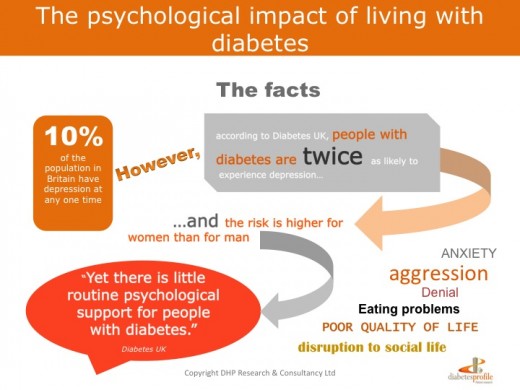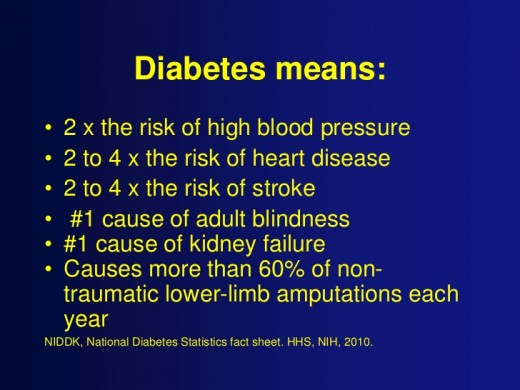Psychological problems, cognitive decline memory loss and dementia associated with Diabetes Mellitus (Type 2 Diabetes)

When thinking of Diabetes 2 most people think of the physical problems and risks: Tingling feet, blindness and amputation mainly. Few remember that Diabetes 2 is a whole body disorder and, since mind and body are closely integrated most of the time, the mind is inevitably affected. The problems range from the common problems of memory, attention and visual perception, through major depression to psychosis and dementia: some researchers already refer to Alzheimers as type 3 diabetes. The causes may include diabetes or the stress of living with diabetes. Since Diabetes is implicated in so many cognitive and psychological problems it is possible that many of the personality quirks traditionally associated with old age: forgetfulness, poor eyesight, irritability, short attention span etc, are symptoms of undiagnosed diabetes
The information provided here is for information, not self diagnosis, and should be discussed with your doctor or whoever deals with your diabetes professionally. In particular no specific actions are recommended. There is no intention to provide advice and readers must perform their own due diligence.

Memory, attention, perception and cognitive decline
Memory loss, depression and cognitive impairment are serious consequences of diabetes [1] and diabetes in middle age is linked to cognitive problems in later life [3]. Further people with type 2 diabetes often (but not invariably) do poorly on measures of learning and memory, whereas deficits in these domains are rarely seen in people with type 1 diabetes [15].
Blood sugar abnormalities, both high[4] and low, are prime suspects as causes with insulin action abnormalities such as insulin deficiency and insulin resistance also suspected [2]
Diabetes also causes a decline in pyschomotor speed, defined as [12] the ability to simultaneously think and act fast [8]. This is likely to impact activities such as driving, sports, for example squash and martial arts, and even understanding what is being said, since that needs a lot of rapid mental processing. Psychomotor speed is something that can be improved with training so those affected may be able to improve it in ways that might help with everyday life: auditory and visual speed training are included in many computerised brain training programs.
It appears that cognitive performance is optimal if blood sugar is roughly between 4 and 15 mmol/l, though this range may vary from person to person. Cognitive dysfunction is not linearly related to the duration of diabetes but the decline is more prominent if the duration of DM is more than 5 years. The co-existence of hypertension with T2DM further increases the risk of cognitive impairment [6].
The effect of diabetes related cognitive decline will vary from individual to individual. A relative decline that is disastrous to those who need to exhibit high cognitive performance in a fluid environment: lawyers, IT specialists and doctors for example, could be merely a nuisance in more stable roles where adherence to work patterns can mask cognitive decline, and there are cases where Alzheimers disease was only diagnosed post mortem with the depredations of the disease being hidden by the sufferer's ability to use their life experiences and “pattern match” relatively complex tasks [13]. In any case the individual may feel the effects and suffer depression and/or anxiety which makes it worse.
Diabetes also comes with an increased risk of dementia [7] possibly as a result of problems with the brain's handling of insulin.
And here is a potential vicious circle. Diabetes treatment aims to restore control of blood sugar levels. Cognitive decline puts this at risk as the sufferer may forget to adhere to their treatment regime, which may accelerate cognitive decline.

Depression
Diabetics are significantly more likely to suffer major depressive disorder [11] a condition that entails substantial suffering, loss of productivity and even loss of life. Diabetics have a 40% greater risk of suffering this disorder and about a 70% higher risk of mild depression over their lifetimes and a 7% higher risk at any one time.[14]
It is not clear whether diabetes causes depression or vice versa or they each feed off the other , result from common biological and/or behavioural factors or the depression is caused by having to live with the disease. People with depression smoke more than the general population and smoking is associated with insulin resistance, reduced insulin secretion responses, increased belly fat, and the development of T2 diabetes. Again there is the possibility of a vicious circle and depression can lead to a failure to handle the estimated two hours a day needed to handle a diabetes treatment regime [11, introduction].
Anxiety and other problems
Anxiety, a condition characterised by inner turmoil and often accompanied by nervous behaviour such as pacing back and forth, butterflies in the stomach, worrying over the past and dread of the future, has had rather less attention from diabetes researchers.
Diabetics are more likely to suffer anxiety, than non diabetics and this can damage adherence to treatment regimes thereby increasing the likelihood of complications and a shortened life.
It can be hard to distinguish between panic attacks and low blood sugar: a professional diagnosis needs to be made.
The anxiety may arise from fear of injection, the stress of living with diabetes or low blood sugar. Panic attacks have been linked to worsening of the sufferer's diabetes and panic related behaviours such as smoking also tends to worsen outcomes.
Depression and Anxiety are not the only psychological problem Diabetics can experience: eating disorders, schizophrenia and bipolar disorder come to diabetics more often than to the rest of the population and ethnic and racial minorities suffer more than whites, at least in the USA though far more research is needed in this field.
Metformin
On top of all this there is evidence that for some at least the medications used to treat diabetes can cause psychological problems. For reasons of space only Metformin which is associated with cognitive decline [14] probably because it depletes the body of Vitamin B12 and calcium is considered. It is possible but not proven that this can be alleviated if not reversed by taking B12 and/or calcium supplements. In the survey reported in [14] diabetics had worse cognitive performance than non-diabetics and, among diabetics those on Metformin had worse cognitive performance. Those patients taking calcium supplements had better cognitive performance than those who were not.

Summing up
The physical effects of Diabetes have understandably been stressed by the medical profession, which is concerned with physical health, but the mental, psychological and neurological effects are at least as devastating, and the tendency for diabetes to lead to dementia is not only a reason for victims to worry but also, if the current diabetes epidemic is not halted, stoking up a major public health problem for the future.
Not all diabetics will suffer cognitive decline, depression or anxiety, let alone other problems but all should be aware of the possibility, monitor themselves and ask others to monitor them.
Further reading
- Researchers Identify Link Between Diabetes and Cognitive Impairment in Older Adults
- Cognitive impairment in diabetic patients: Can diabetic control prevent cognitive decline? Takahiko Kawamura, Toshitaka Umemura and Nigishi Hotta
- Diabetes in Middle Age Linked to Cognitive Problems Later
- Relationships Between Hyperglycemia and Cognitive Performance Among Adults With Type 1 and Type 2 Diabetes: Daniel J. Cox, PHD, Boris P. Kovatchev, PHD, Linda A. Gonder-Frederick, PHD, Kent H. Summers, PHD, Anthony McCall, MD, PHD, Kevin J. Grimm, MA and William L. Clarke, MD
- Cognitive Impairment and Dementia in Type 2 Diabetes Mellitus Alexandra Mastro, Physician Assistant Candidate; James B. Caputo, RPh, PharmD; Mary C. Vagula, PhD
- Cognitive impairment in type 2 diabetes mellitus Mohammed Abdul Hannan Hazari, Barra Ram Reddy, Nazia Uzma ,Bhaskarpillai Santhosh Kumar
- Cognitive Dysfunction and Diabetes Mellitus Christopher T. Kodl and Elizabeth R. Seaquist
- Type 2 diabetes as a risk factor for cognitive impairment: current insights: Hiroyuki Umegaki
- Diabetes linked to cognitive problems
- Diabetes in Midlife Linked to Significant Cognitive Decline 20 Years Later
- Psychological Issues in Adults with Type 2 Diabetes in S. Pagoto (ed.), Psychological Co-morbidities of Physical Illness: A Behavioral Medicine Perspective, Springer 2011
- The Wisdom Paradox: How Your Mind Can Grow Stronger As Your Brain Grows Older: Elhonon Goldberg, Publisher: Gotham 2006 ISBN-10: 1592401872 ISBN-13: 978-1592401871
- Increased risk of cognitive impairment in patients with diabetes is associated with Metformin: multiple authors published in http://care.diabetesjournals.org
- Diabetes and cognitive dysfunction Rory J McCrimmon, Christopher M Ryan, Brian M Frie Lancet 2012; 379: 2291–99 Published Online June 9, 2012 DOI:10.1016/S0140- 6736(12)60360-2







